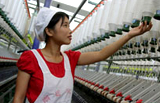Syngenta opens Brazil sugarcane plant
By Zhou Siyu in Itapolis, Brazil (China Daily) Updated: 2012-06-15 09:33
Sugar imports surge on growing population and urbanization
Syngenta, the world's largest agrochemicals company, opened a $100 million sugarcane processing plant on Wednesday in Brazil, to help satisfy China's growing demand for sugar.
"The Chinese appetite, which continues to grow, is a game-changer for many agricultural producers such as Brazil," said Syngenta Chief Executive Officer Mike Mack.
Daniel Bachner, the Swiss company's global director of sugarcane business, said China's burgeoning demand for sugar is "one of the drivers" of the company's investments in innovative sugarcane planting technologies.
Bachner admitted to tensions resulting from competing demand in Brazil for sugarcane from the food and energy industries, as the plant can also be used to produce ethanol, an important source of energy for the South American country.
But "we have to increase the production of sugarcane", he said. "Otherwise, there may not be enough sugar exports to meet the world's demand, especially China's."
Thanks to its growing population and rapid urbanization, China has become a net sugar importer in recent years.
In 2010, the country's sugar imports rose to a historic high of 2.06 million metric tons, according to official data.
China's sugar imports surged 2.4 times year-on-year in the first four months of this year to 810,000 tons, according to the General Administration of Customs.
The technological level of China's sugar production is still very low, especially when compared with countries such as Brazil and Thailand, which are the world's major sugar producers, analysts said.
"There is still great potential to improve China's sugar productivity," Bachner said.
The company said it hoped that the technology used at its new sugarcane-processing plant, located in Itapolis in Brazil's Sao Paulo state, will increase sugarcane production by 10 percent to 15 percent per hectare.
The company estimated its annual sales of this new technology after 2015 would reach $500 million in Brazil alone and plans to launch it into China in the next two years, Bachner said.
In a bid to combine its technological advantages in seeds and agricultural chemicals, the company started integrating its global business in February last year. The new sugarcane cultivation technology is one of its latest efforts to integrate its technologies
Syngenta's sales last year surged 14 percent on a year-on-year basis to $13.3 billion, while net income jumped by 14 percent year-on-year to $1.6 billion.
zhousiyu@chinadaily.com.cn
- Yuan drops again as rate adjustment continues
- Alibaba to buy back $4b of stock
- Alibaba skids as revenue growth slowest in three years
- 8 groups yuan depreciation will impact most
- Chinese markets will become more attractive to Europeans
- Yuan may stumble, but will not fall
- China central bank says capable of stabilizing yuan
- Switzerland begins public consultations on joining China-led AIIB
















